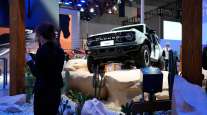Senior Reporter
Democratic Senators Raise Cybersecurity Concerns About Autonomous Vehicles

[Stay on top of transportation news: Get TTNews in your inbox.]
Two key senators are pushing to enhance cybersecurity protections for autonomous vehicles absent a comprehensive policy proposal about the technology in Congress.
Democratic Sens. Ed Markey of Massachusetts and Richard Blumenthal of Connecticut have insisted that vehicles connected to the internet have the potential of being hacked and controlled remotely, a scenario that risks the safety of motorists, passengers and pedestrians.
The senators, members of the Commerce Committee with jurisdiction over trucking policy, recently pressed the National Highway Traffic Safety Administration for input about efforts to promote safety across industries proceeding with autonomous technologies.
Gov Cyber 0629 Eu Pw by Transport Topics on Scribd
“We are deeply troubled by NHTSA’s deafening silence in response to the repeated reports of vulnerabilities and risks of hacking of internet-connected cars,” the senators wrote to the agency June 11. “We believe NHTSA must end its dangerously reactive approach to cybersecurity and do more to protect consumers before a malicious attack leading to a fatality occurs.”
Last year, the senators introduced legislation that would direct the safety agency and the Federal Trade Commission to establish standards designed to guarantee cybersecurity in predominantly computerized vehicles and to protect users’ privacy.

Markey

Blumenthal
The Security and Privacy in Your Car, or SPY Car, Act would establish a rating system described as a “cyber dashboard,” meant to inform consumers about a vehicle’s performance capabilities. The measure also would instruct the Federal Highway Administration to develop a “cybersecurity tool,” as well as appoint a “cyber coordinator” tasked with helping transportation authorities identify, detect, safeguard and respond to cybersecurity concerns.
On Capitol Hill, transportation policymakers have yet to debate comprehensive autonomous vehicle legislation. Senior lawmakers have indicated upcoming provisions that would govern automated vehicles likely would not include every class of vehicles. In the previous session of Congress, the House advanced a car-centric autonomous technology measure that failed to gain approval in the Senate.
“We should pass legislation that establishes safety standards and regulations for the gradual deployment of self-driving cars. The legislation should facilitate the collection and reporting of vital crash and incident data, and protect Americans’ rights to access the courts for the inevitable incidents related to self-driving cars,” Rep. Frank Pallone (D-N.J.), chairman of the House Energy and Commerce Committee, said in February.
“It should also promote consumer awareness and provide robust resources to federal regulators to oversee these complex technologies, while also preserving the appropriate role of state and local governments. We are working on a bipartisan, bicameral basis to draft a self-driving car bill that will help ensure that these life-saving technologies are safely deployed.”
During the Trump administration, the U.S. Department of Transportation has produced myriad safety guidances for stakeholders developing the technology. This month, NHTSA launched a program meant to enhance transparency and inform the public about automated technologies.
The new AV TEST Initiative will bring you news and information about the development and testing of automated vehicle technology in your state. Learn more: https://t.co/jdzEWTh4ey pic.twitter.com/lcgqhlQgCg — nhtsagov (@NHTSAgov) June 18, 2020
This Automated Vehicle Transparency and Engagement for Safe Testing (AV TEST) Initiative would facilitate engagement among government officials, industry stakeholders and the public. Participants include firms such as Beep, Cruise, Fiat Chrysler Automobiles, Local Motors, Navya, Nuro, Toyota, Uber and Waymo.
“Through this initiative, the department is creating a formal platform for federal, state and local government to coordinate and share information in a standard way,” U.S. Transportation Secretary Elaine Chao said.

COVID-19 has placed significant strain on many freight networks. So how are third-party logistics providers adapting to meet these challenges? Host Seth Clevenger chats with two 3PL executives who have had firsthand experience contending with this crisis. Hear a snippet, above, and get the full program by going to RoadSigns.TTNews.com.
In January, DOT released the “Ensuring American Leadership in Automated Vehicle Technologies” meant to unify principles across more than three dozen federal departments, agencies, commissions and executive offices, as well as offer guidance to state and local agencies, technology experts and industry representatives.
The guidelines aim to provide a consistent regulatory approach, promote innovation and prioritize safety.
The department noted it is “acting as a convener and facilitator, partnering with a broad coalition of industry, academic, states and local, safety advocacy, and transportation stakeholders to support the safe development, testing and integration of automated vehicle technologies.”
Want more news? Listen to today's daily briefing:
Subscribe: Apple Podcasts | Spotify | Amazon Alexa | Google Assistant | More




